The School of Chemistry is housed in two large, purpose-designed buildings and is exceptionally well equipped. A building specially devoted to synthetic chemistry, complete with state-of-the-art laboratories and fumehoods, was opened in December 1999.
Our strong research profile is sustained by a world class equipment and instrument infrastructure offering researchers access to a wide range of analytical and visualisation techniques and associated technical expertise.
Industry
We welcome enquiries from industrialists who might wish to use these services. Please contact our industrial services team for further information.
Search or browse our Chemistry facilities
| Facility | keywords |
|---|---|
Nuclear Magnetic Resonance
On top of being the first-choice technique for characterisation of new organic compounds, the NMR facilities at Bristol are also used for studying 11B 31P 19F and a wide variety of transition metal nucleii. Find out more |
Show all; |
Mass Spectrometry The facility enables us to look at molecular ions and fragmentation patterns for almost any species including biological samples that were, until a few years ago, impossible to study using these techniques. Find out more |
Show all; |
X-ray crystallography
The laboratory also houses a high throughput powder X-ray diffractometer equipped with a linear detector, robotic sample changer and 30 silicon wafer sample holders. This allows powder diffraction data for a sub-milligram quantity of sample to be collected in minutes. Find out more |
Show all; |
Electron and scanning probe microscopy All are equipped with digital image capture and energy dispersive X-ray systems, with our two scanning probe microscopes also able to carry out atomic resolution imaging. Find out more |
Show all; |
Bristol Aerosols and Colloids Instrument Centre In addition, BACIC supports users from the EPSRC Centre for Doctoral Training in Aerosol Science. Find out more |
Show all; |
Worsley Chemical Library In terms of the literature available, the library houses recommended course textbooks; past Chemistry exam papers; key databases (SciFinder Scholar, Reaxys, Web of Science, etc.); academic journals online or in hard copy, research monographs; and School of Chemistry theses. Find out more |
Show all; |
Bristol Automated Synthesis Facility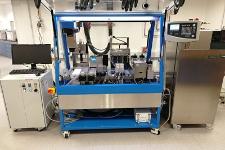
The SWING Automated Workstation (designed by Chemspeed Technologies) is tasked with automated parallel chemical synthesis and can analyse the majority of reactions employed in modern synthesis. Up to 32 reactions can be run in parallel in 13 mL glass array reactors, with SWILE technology allowing our SWING platform to gravimetrically pick and dispense solids and powders Find out more |
Show all; |
Bristol Radiocarbon Accelerator Mass Spectrometry Facility (BRAMS)BRAMS is a state-of-the-art radiocarbon dating facility at the University of Bristol. Based in the School of Chemistry, BRAMS provides a radiocarbon dating service to both University of Bristol researchers and to external academic and commercial users. Find out more |

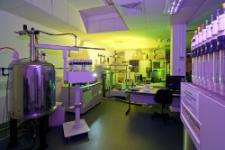 The NMR Facilities in the School of Chemistry are some of the best equipped in the UK, with 12 solution-state NMR spectrometers (300-700MHz) used for research and undergraduate teaching, as well as being available for industrial use (see below for our capabilities).
The NMR Facilities in the School of Chemistry are some of the best equipped in the UK, with 12 solution-state NMR spectrometers (300-700MHz) used for research and undergraduate teaching, as well as being available for industrial use (see below for our capabilities).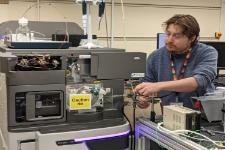 As well as providing routine mass spectral analysis, the mass spectrometry laboratory is also home to more advanced applications development and non-routine analysis. The facility works closely with the neighbouring NERC Life Sciences Mass Spectrometry Facility.
As well as providing routine mass spectral analysis, the mass spectrometry laboratory is also home to more advanced applications development and non-routine analysis. The facility works closely with the neighbouring NERC Life Sciences Mass Spectrometry Facility.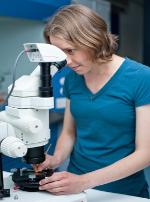 A purpose-built crystallography laboratory houses three single crystal diffractometers and one powder diffractometer.
A purpose-built crystallography laboratory houses three single crystal diffractometers and one powder diffractometer.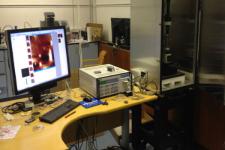 Our electron and scanning probe microscopy facility allows us to observe elemental composition through use of our suite of scanning electron and trasmission electron microscopes.
Our electron and scanning probe microscopy facility allows us to observe elemental composition through use of our suite of scanning electron and trasmission electron microscopes.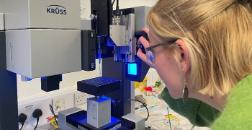 A
A The Worsley Chemical Library offers students quiet study and group study spaces; open access PCs; wireless hotspots; and printing and scanning facilities.
The Worsley Chemical Library offers students quiet study and group study spaces; open access PCs; wireless hotspots; and printing and scanning facilities.